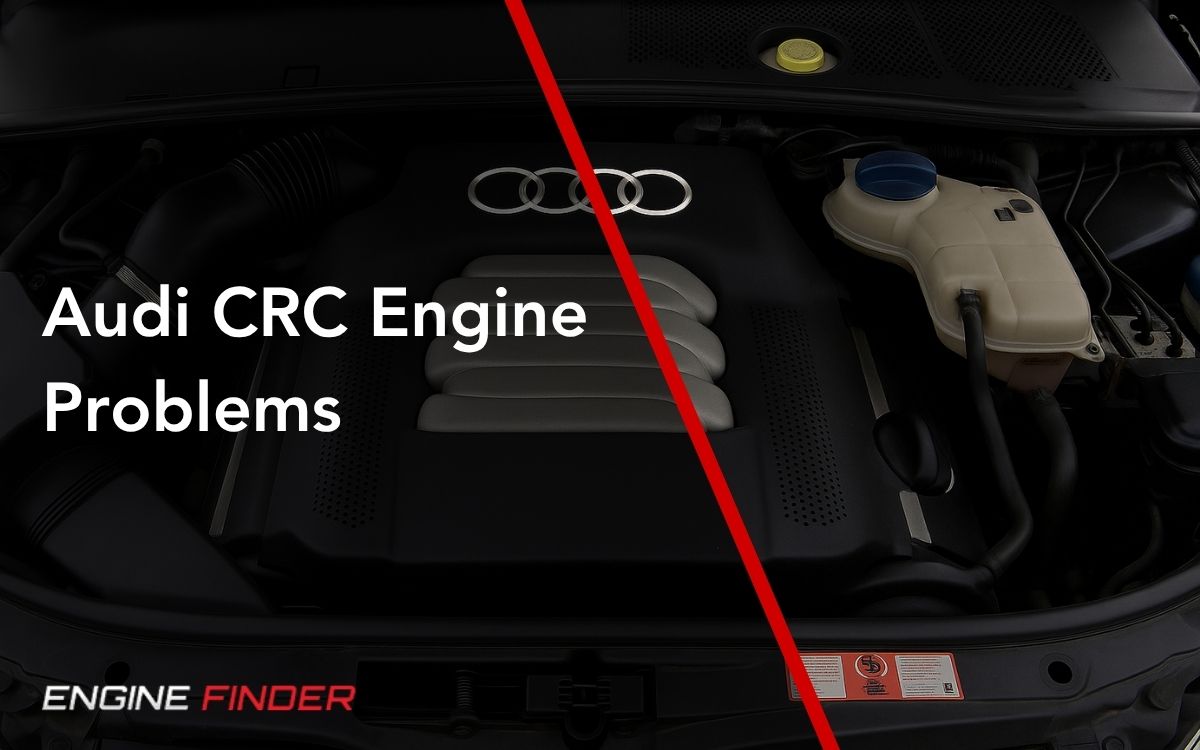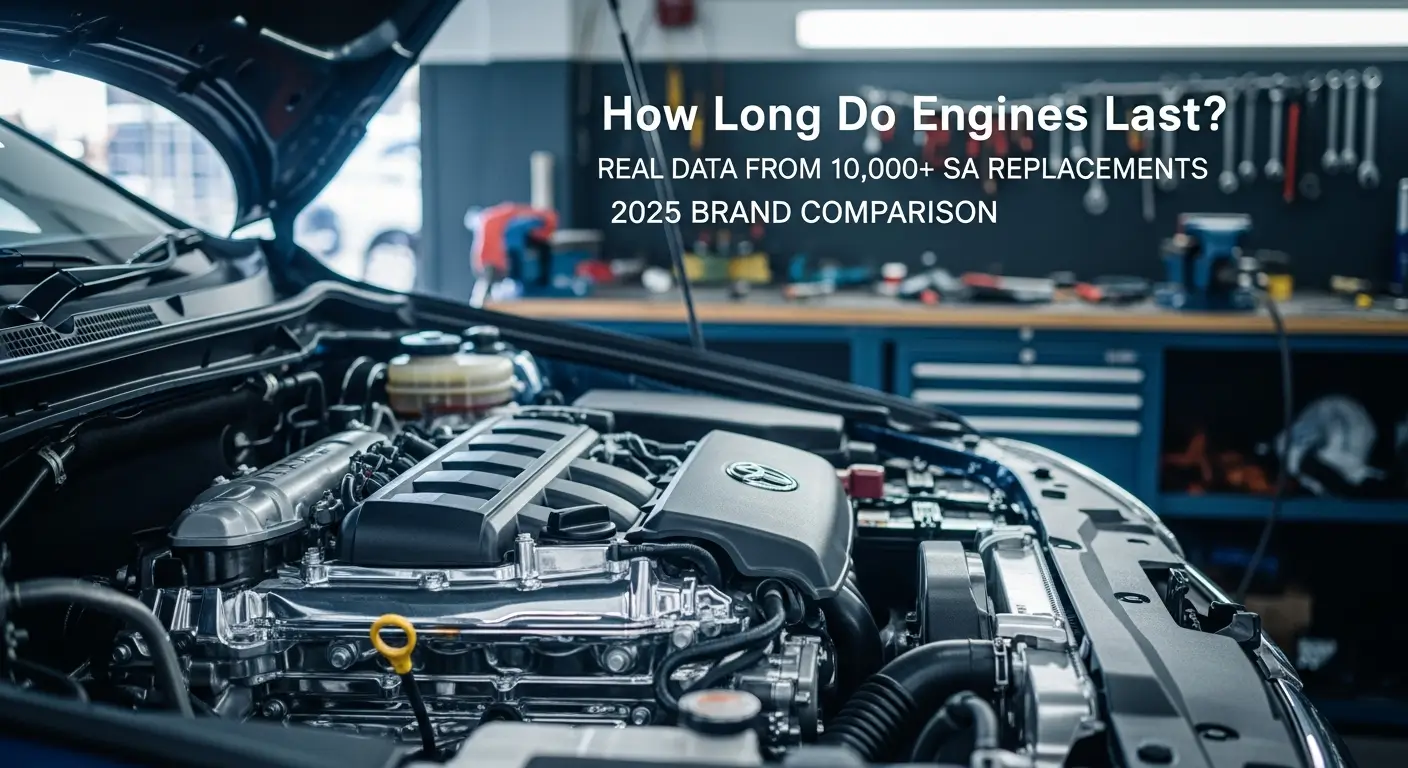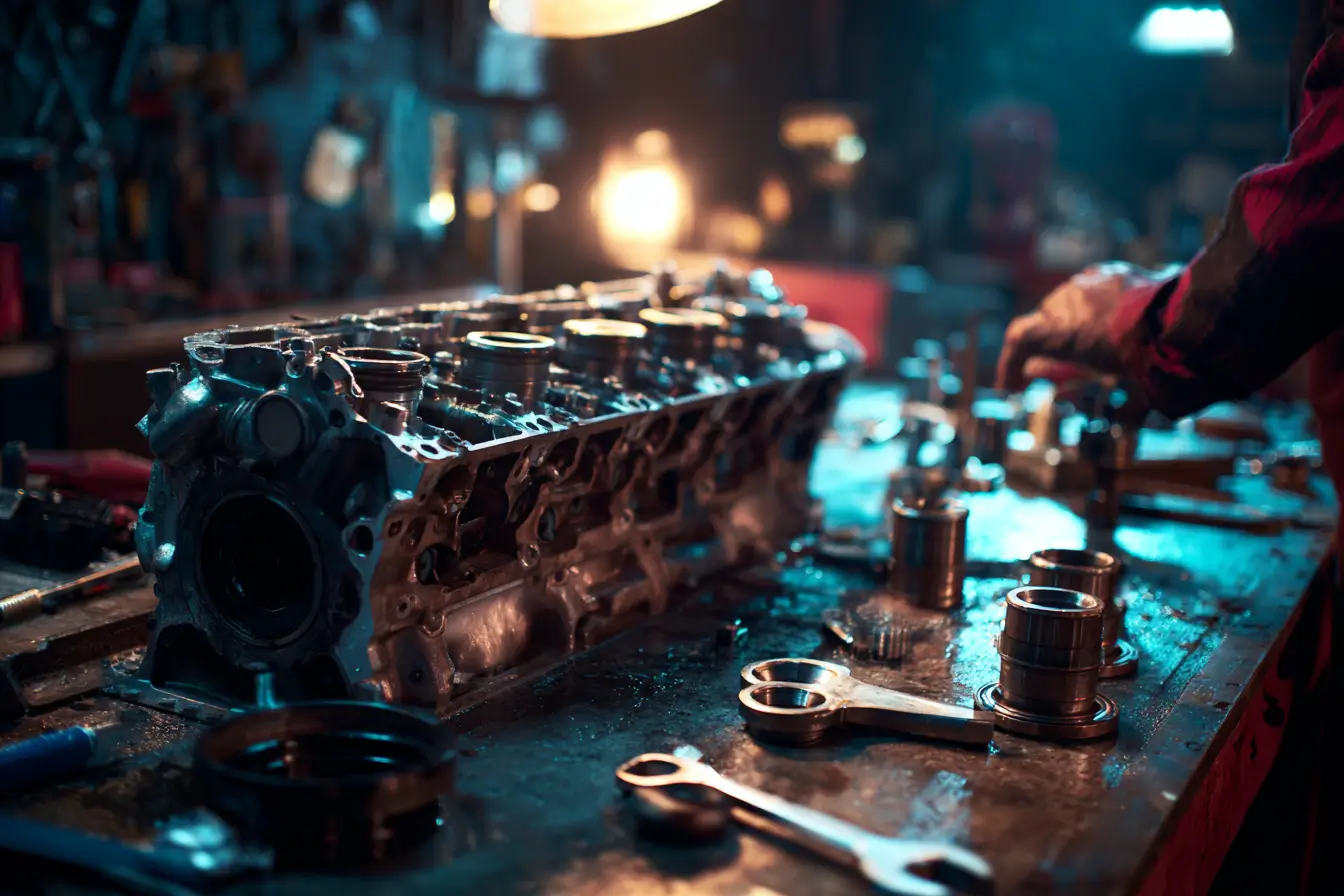
Common Audi CRC Engine Problems: Expert Solutions & Costs
Key Takeaways
| Problem | Main Symptoms | Possible Causes |
|---|---|---|
| EGR System Malfunctions | Black smoke, reduced power, rough idle | Carbon buildup, cooler leaks, sensor failure |
| DPF Regeneration Issues | Warning lights, limp mode, fuel smell | Incomplete cycles, sensor failures, contamination |
| Turbocharger Problems | Power loss, whistling noise, oil leaks | Carbon buildup, actuator failure, bearing wear |
| Fuel Injection System Issues | Hard starting, misfires, poor economy | Contaminated fuel, worn injectors, pump failure |
| Intake Manifold Problems | Rattling noise, power loss, poor acceleration | Carbon buildup, flap motor failure, vacuum leaks |
IMPORTANT NOTICE: This article has been completely rewritten to correct significant factual errors in the previous version. The Audi CRC engine is a 3.0L V6 TDI from the EA897 family, not a 2.0L inline-4 EA288 engine as previously stated.
The Audi CRC engine is a sophisticated 3.0-liter V6 turbocharged diesel engine from the EA897 family, representing Audi’s advanced TDI technology for luxury SUVs. Found in high-end vehicles including the Audi Q7, Porsche Cayenne, and Volkswagen Touareg from 2009-2017, this engine delivers substantial power and torque while maintaining reasonable fuel efficiency for its class. However, like all complex V6 diesel engines, the CRC has developed certain common issues that owners should understand.
Audi CRC Engine Specifications
| Specification | Details |
|---|---|
| Engine Code | CRC/CJG (related variants) |
| Engine Family | EA897 V6 TDI |
| Displacement | 2,967cc (3.0L) |
| Configuration | V6, DOHC, Twin Turbocharged |
| Power Output | 180 kW (239-245 hp) |
| Torque Output | 500-580 Nm |
| Fuel System | Common Rail Direct Injection |
| Compression Ratio | 17.0:1 |
| Application | Audi Q7, Porsche Cayenne, VW Touareg |
| Production Years | 2009-2017 |
1. EGR System Malfunctions
The Exhaust Gas Recirculation (EGR) system in the CRC V6 engine is particularly prone to carbon buildup due to the higher exhaust gas volumes from the V6 configuration, affecting the EGR valve, cooler assembly, and related components.
Causes
- Excessive carbon accumulation in EGR valve passages
- EGR cooler internal leaks and cracking
- Faulty EGR position sensor
- Blocked EGR inlet manifold and piping
- Poor quality diesel fuel and short-trip driving patterns
Symptoms
- Dense black smoke from exhaust, especially under acceleration
- Significant reduction in engine power and acceleration
- Engine warning lights (P0401, P0403, P0404)
- Rough idling, particularly when cold
- Increased fuel consumption and poor economy
Solution
- EGR valve cleaning or replacement: R12,000 - R18,000
- EGR cooler replacement: R18,000 - R28,000
- Complete EGR system overhaul: R25,000 - R35,000
- Position sensor replacement: R3,500 - R5,500
DIY Difficulty / Hours
- EGR valve cleaning: High difficulty / 4-6 hours (V6 access challenges)
- EGR cooler replacement: Professional only / 8-12 hours
Important Warning
EGR system problems on V6 engines can lead to severe power loss and potential turbocharger damage. The complex V6 layout makes DIY repairs challenging - professional diagnosis is strongly recommended.
2. DPF Regeneration Issues
The Diesel Particulate Filter (DPF) system on the CRC engine requires regular regeneration cycles to burn off accumulated soot. The V6 configuration and luxury SUV application patterns frequently lead to DPF-related problems.
Causes
- Incomplete regeneration cycles from predominantly city driving
- DPF temperature sensor failures
- Contaminated or severely clogged DPF matrix
- Faulty differential pressure sensors
- Software calibration issues specific to EA897 engines
Symptoms
- DPF warning light persistently illuminated
- Engine enters limp mode with reduced power
- Poor acceleration and throttle response
- Strong diesel smell during attempted regeneration
- Significantly increased fuel consumption
Solution
- Forced DPF regeneration: R3,500 - R5,500
- DPF professional cleaning: R12,000 - R18,000
- DPF replacement: R45,000 - R75,000
- Sensor replacement: R4,000 - R8,000
DIY Difficulty / Hours
- Forced regeneration: Moderate (diagnostic tool required) / 1-2 hours
- DPF replacement: Professional only / 8-12 hours
Prevention Tip
Prevent DPF issues by taking your luxury SUV on highway drives for 30+ minutes weekly. The CRC V6 engine requires longer regeneration cycles than smaller engines due to higher soot production.
3. Turbocharger Problems
The CRC engine features twin turbochargers that can develop issues with actuator mechanisms, internal components, and intercooler systems, significantly affecting the substantial power output expected from this V6 engine.
Causes
- Carbon buildup in turbocharger vanes and housings
- Turbocharger actuator motor failure
- Oil contamination and bearing wear from extended service intervals
- Boost pressure sensor malfunctions
- Inadequate lubrication during cold starts in luxury vehicles
Symptoms
- Dramatic loss of power during acceleration
- Loud whistling or whining noises from engine bay
- Blue or black smoke from exhaust
- Oil leaks around turbocharger housings
- Multiple boost pressure fault codes
Solution
- Twin turbocharger cleaning service: R15,000 - R22,000
- Single actuator motor replacement: R18,000 - R28,000
- Complete turbocharger rebuild (one unit): R35,000 - R55,000
- New turbocharger replacement: R65,000 - R95,000
DIY Difficulty / Hours
- Actuator replacement: Professional only / 6-10 hours (V6 complexity)
- Complete turbo replacement: Professional only / 12-18 hours
Technical Note
Twin turbocharger systems require premium synthetic oil changes every 10,000km maximum. Always allow the engine to idle for 60 seconds before shutdown after highway driving to prevent turbocharger damage.
4. Fuel Injection System Issues
The high-pressure common rail fuel injection system can develop problems with injectors, the high-pressure pump, and related sensors, critically affecting the refined performance expected from this luxury V6 diesel engine.
Causes
- Contaminated or poor-quality diesel fuel
- Worn fuel injector nozzles and seals (6 injectors vs 4 in inline engines)
- High-pressure fuel pump failure
- Fuel rail pressure sensor faults
- Water contamination in fuel system
Symptoms
- Difficult starting, especially when cold
- Engine misfires and rough running
- Fuel rail pressure error codes
- Metallic knocking from injector operation
- Dramatically reduced fuel economy
Solution
- Fuel system cleaning service: R5,000 - R8,500
- Single injector replacement: R12,000 - R18,000
- Complete injector set (6 injectors): R65,000 - R95,000
- High-pressure pump replacement: R35,000 - R55,000
DIY Difficulty / Hours
- Fuel filter replacement: Moderate / 45 minutes
- Injector replacement: Professional only / 8-14 hours (V6 access complexity)
Critical Warning
Never attempt to service high-pressure fuel components without proper tools and training. V6 fuel systems operate at pressures exceeding 2,000 bar and require specialized equipment for safe service.
5. Intake Manifold Problems
The CRC V6 engine features a sophisticated intake manifold with variable geometry and swirl flaps that can develop carbon buildup and mechanical failures, affecting airflow distribution to all six cylinders.
Causes
- Carbon buildup in manifold passages and swirl flaps
- Intake flap motor failure
- Vacuum leaks in manifold gaskets
- Position sensor failures
- Oil vapor contamination from PCV system
Symptoms
- Metallic rattling noise from intake area
- Reduced power and poor acceleration response
- Uneven idle and rough running
- Error codes related to air mass or manifold pressure
- Whistling sounds from intake system
Solution
- Intake manifold cleaning: R8,000 - R12,000
- Swirl flap motor replacement: R12,000 - R18,000
- Complete manifold replacement: R25,000 - R38,000
- Gasket replacement: R5,000 - R8,000
DIY Difficulty / Hours
- Intake cleaning: High difficulty / 4-6 hours
- Manifold replacement: Professional only / 8-12 hours
Technical Note
The V6 intake manifold is more complex than inline-4 systems and requires precise timing for optimal performance. Regular maintenance with quality engine oil helps prevent carbon-related issues.
Preventative Maintenance Tips
Regular Service Schedule
| Service Type | Interval | Critical Components |
|---|---|---|
| Oil and Filter Change | Every 10,000km or 10 months | High-quality 5W-30 oil (VW 507.00 spec) |
| Fuel Filter Replacement | Every 30,000km | OEM quality filter recommended |
| Air Filter Service | Every 25,000km | Clean air intake system |
| EGR System Cleaning | Every 60,000km | Professional cleaning service |
| DPF Maintenance | As required | Monitor regeneration cycles |
Critical Maintenance Items
- Premium Fuel: Always use high-quality diesel fuel and consider regular additives
- Oil Changes: Never exceed 10,000km intervals, use VW 507.00 specification oil only
- Highway Driving: Regular extended drives help DPF regeneration and carbon cleaning
- Early Diagnosis: Address warning lights and unusual symptoms immediately
- Professional Service: Use technicians experienced with EA897 V6 engines
FAQ
How reliable is the Audi CRC V6 engine overall?
The CRC engine is generally reliable when properly maintained, but requires more frequent attention than smaller engines due to its V6 complexity and twin turbocharger setup. Most issues are preventable through premium maintenance practices and quality fuel use.
What’s the expected lifespan of a CRC V6 engine?
With proper maintenance, CRC engines typically achieve 250,000-350,000km. Critical factors include regular oil changes with premium oil, quality diesel fuel, proper DPF regeneration, and immediate attention to warning signs.
Are CRC engines affected by any major recalls?
Some CRC variants have been subject to software updates for emission control systems and turbocharger control modules. Check with your local Audi dealer for any applicable campaigns or technical service bulletins for your specific VIN.
What are the warning signs that require immediate attention?
Engine warning lights, unusual noises (especially from turbochargers), loss of power, excessive smoke, DPF regeneration failures, or any oil leaks should be investigated immediately to prevent major damage.
How much does annual CRC V6 engine maintenance typically cost?
Routine maintenance costs approximately R18,000-R28,000 annually, including oil changes, filters, and basic inspections. Major services every 60,000km may cost R35,000-R55,000 due to V6 complexity.
Watch: EA897 V6 Engine Analysis and Maintenance
Comprehensive analysis of EA897 V6 engine technology and common maintenance issues by Audi Technical Training
Detailed twin turbocharger maintenance and troubleshooting guide by Professional Automotive Training
Conclusion
The Audi CRC V6 engine represents sophisticated diesel technology, offering impressive power and torque suitable for luxury SUVs. While it requires more specialized maintenance attention than smaller engines due to its V6 configuration and twin turbocharger setup, proper care ensures reliable operation for hundreds of thousands of kilometers.
Key success factors include maintaining strict service intervals with premium materials, using quality diesel fuel, ensuring proper DPF regeneration cycles, and addressing any warning signs promptly. For South African owners dealing with these engine issues, Engine Finder provides access to quality Audi engines for sale and professional diagnostic services across the country.
Regular maintenance by qualified technicians familiar with EA897 V6 technology is essential for optimal CRC engine performance and longevity in South African driving conditions.
References and Further Reading
Technical Resources
- Audi Self Study Program 820440 - EA897 V6 TDI Engine Family (PDF)
- Audi 3.0L V6 TDI Engine Technical Service Bulletin (NHTSA)
Maintenance Guides
- VW/Audi Workshop Manual: Servicing V6 TDI Engine EA897
- Darkside Developments: EA897 V6 Performance Guide
Community Resources
Related Articles
Explore more insights on similar topics

How Long Do Engines Last on Average? Complete Longevity Guide
Understand real-world engine lifespan ranges, warning signs, lifecycle stages, costs, and maintenance best practices for South African drivers.

How Does an Engine Overhaul Work? Complete Guide to Engine Rebuilds
Learn everything about engine overhauls: types, warning signs, process, costs, and when to rebuild vs replace your engine in South Africa.
.webp)
Timing Chain vs Timing Belt: Complete Guide to Cambelt Replacement & Lifespan
Learn everything about timing chains and timing belts (cambelts): differences, lifespans, replacement costs, and which is better for your engine in South Africa.
Important Disclaimer
This content is for informational purposes only and is based on research from automotive industry sources. Engine Finder is not a certified automotive repair facility. Always consult with qualified automotive professionals before performing any repairs or maintenance. Improper repairs can result in personal injury, property damage, or vehicle malfunction. We assume no responsibility for actions taken based on this information.
